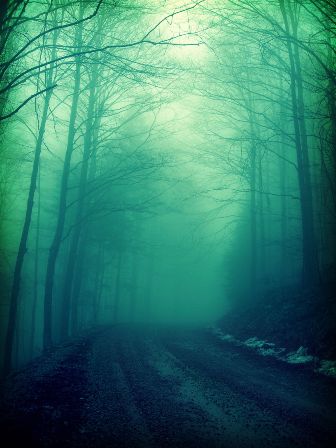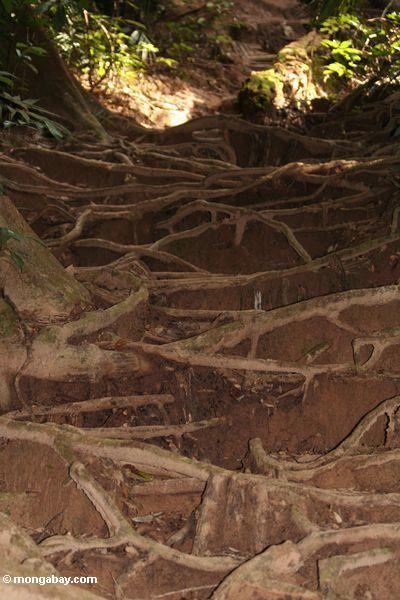It looks like you're using an Ad Blocker.
Please white-list or disable AboveTopSecret.com in your ad-blocking tool.
Thank you.
Some features of ATS will be disabled while you continue to use an ad-blocker.
8
share:
A storm blew in this afternoon and as I love storms I walked outside to watch it. As always, just before the rain started coming down heavily that
amazing ‘rain smell’ hit me and it got me wondering – what exactly is it? So I decided to do a bit of research.
The official name for rain smell is Petrichor
What you are actually smelling is a number of different things. Firstly the rain itself, which is slightly acidic containing carbonic acid caused by the rain absorbing carbon dioxide from the atmosphere. If you live in the sitting this will begin reacting with various oils the road, rubber from car tires and other pollutants which have settled on various surfaces which will also release various aromas. Due all the carbon dioxide being pumped out into the atmosphere within areas containing a higher concentration of people this carbonic acid will be slightly stronger as well.
If you live however in a natural area then this mildly acidic rainwater reacts with various oils from certain plant species and is then absorbed into the ground. It also breaks down various soil minerals which also release an aroma. Another constituent to this petrichor perfume is the spoors of filamentous bacteria Actinomycetes.

There are main other aromatics which are released via water or react with the weak carbonic acid but the last main constituent is what’s known as Geosmin
Geosmin is responsible for the earthy taste of beets, some varieties of potatos other ground derived foods. It is a chief contributor to the taste of snails, and also to the muddy smell of bottom dwelling freshwater fish such as carp or catfish as well as many crayfish species. It is also what you smell in freshly disturbed earth, say if you’ve just dug a hole, and as mentioned above it is one of the main constituents of petrichor – that beautiful smell of rain.

The official name for rain smell is Petrichor
Petrichor is the scent of rain on dry earth. The word is constructed from Greek, petra, meaning stone + ichor, the fluid that flows in the veins of the gods in Greek mythology.
The term was coined in 1964 by two Australian researchers, Bear and Thomas, for an article in the journal Nature. Source
What you are actually smelling is a number of different things. Firstly the rain itself, which is slightly acidic containing carbonic acid caused by the rain absorbing carbon dioxide from the atmosphere. If you live in the sitting this will begin reacting with various oils the road, rubber from car tires and other pollutants which have settled on various surfaces which will also release various aromas. Due all the carbon dioxide being pumped out into the atmosphere within areas containing a higher concentration of people this carbonic acid will be slightly stronger as well.
If you live however in a natural area then this mildly acidic rainwater reacts with various oils from certain plant species and is then absorbed into the ground. It also breaks down various soil minerals which also release an aroma. Another constituent to this petrichor perfume is the spoors of filamentous bacteria Actinomycetes.
Actinomycetes, a type of filamentous bacteria, grow in soil when conditions are damp and warm. When the soil dries out, the bacteria produces spores in the soil. The wetness and force of rainfall kick these tiny spores up into the air where the moisture after a rain acts as an aerosol (just like an aerosol air freshener). The moist air easily carries the spores to us so we breathe them in. These spores have a distinctive, earthy smell we often associate with rainfall. The bacteria is extremely common and can be found in areas all over the world, which accounts for the universality of this sweet "after-the-rain" smell. Since the bacteria thrives in moist soil but releases the spores once the soil dries out, the smell is most acute after a rain that follows a dry spell, although you'll notice it to some degree after most rainstorms. Source

There are main other aromatics which are released via water or react with the weak carbonic acid but the last main constituent is what’s known as Geosmin
Geosmin, which literally translates to "earth smell", is an organic compound with a distinct earthy flavour and aroma.
Geosmin is produced by several classes of microbes, including cyanobacteria (blue-green algae) and actinobacteria (especially Streptomyces), and released when these microbes die. Communities whose water supplies depend on surface water can periodically experience episodes of unpleasant-tasting water when a sharp drop in the population of these bacteria releases geosmin into the local water supply. Source
Geosmin is responsible for the earthy taste of beets, some varieties of potatos other ground derived foods. It is a chief contributor to the taste of snails, and also to the muddy smell of bottom dwelling freshwater fish such as carp or catfish as well as many crayfish species. It is also what you smell in freshly disturbed earth, say if you’ve just dug a hole, and as mentioned above it is one of the main constituents of petrichor – that beautiful smell of rain.

Very informative post.
I have a love/hate relationship with the knowledge you have provided. I have always loved the smell of rain, but now that you have broken it down to scientific facts...It is much less romantic.
I have a love/hate relationship with the knowledge you have provided. I have always loved the smell of rain, but now that you have broken it down to scientific facts...It is much less romantic.
reply to post by mileysubet
I hear your, but then again I know stars are just burning balls of gas and I know rainbows are just diffracted light through water droplets, but it still makes them know less magical to me……
I hear your, but then again I know stars are just burning balls of gas and I know rainbows are just diffracted light through water droplets, but it still makes them know less magical to me……
Originally posted by mileysubet now that you have broken it down to scientific facts...It is much less romantic.
Romance is just a curious pattern of electrical signals in the brain Sorry, can't help it!
Just had a massive summer storm in the middle of the Pilbara and the smell of Petichor was everywhere. Reminded me of this thread so I'm here to give
it a shameless bump cos I think the information is really interesting.
This is a very eye opening article or a way of change of thinking. For me the smell of the air after a lightening strike is also very fresh
smelling.
It makes me think of the odd things about this blue planet in space and how everything is inter-related.
It brings the saying "A million years on one planet - we are all brothers and sisters" into better focus.
We humans couldn't be what we are today if dinosaurs had not roamed the planet eating whatever and pooping out recycled plants products that make up the earth/dirt covering in which everything grows.
Little bacteria and amoebas cover our planet and create a symbiotic living within all of us. Its all just too small for the human eye to see until we use a microscope to bring the little buggers into focus.
Thank you for your post OP it created a moment where I could think differently about my planet!
It makes me think of the odd things about this blue planet in space and how everything is inter-related.
It brings the saying "A million years on one planet - we are all brothers and sisters" into better focus.
We humans couldn't be what we are today if dinosaurs had not roamed the planet eating whatever and pooping out recycled plants products that make up the earth/dirt covering in which everything grows.
Little bacteria and amoebas cover our planet and create a symbiotic living within all of us. Its all just too small for the human eye to see until we use a microscope to bring the little buggers into focus.
Thank you for your post OP it created a moment where I could think differently about my planet!
new topics
-
Electrical tricks for saving money
Education and Media: 3 hours ago -
VP's Secret Service agent brawls with other agents at Andrews
Mainstream News: 4 hours ago -
Sunak spinning the sickness figures
Other Current Events: 5 hours ago -
Nearly 70% Of Americans Want Talks To End War In Ukraine
Political Issues: 5 hours ago -
Late Night with the Devil - a really good unusual modern horror film.
Movies: 7 hours ago -
Cats Used as Live Bait to Train Ferocious Pitbulls in Illegal NYC Dogfighting
Social Issues and Civil Unrest: 8 hours ago -
The Good News According to Jesus - Episode 1
Religion, Faith, And Theology: 10 hours ago
top topics
-
Cats Used as Live Bait to Train Ferocious Pitbulls in Illegal NYC Dogfighting
Social Issues and Civil Unrest: 8 hours ago, 8 flags -
Florida man's trip overseas ends in shock over $143,000 T-Mobile phone bill
Social Issues and Civil Unrest: 15 hours ago, 8 flags -
VP's Secret Service agent brawls with other agents at Andrews
Mainstream News: 4 hours ago, 8 flags -
Former Labour minister Frank Field dies aged 81
People: 17 hours ago, 4 flags -
HORRIBLE !! Russian Soldier Drinking Own Urine To Survive In Battle
World War Three: 12 hours ago, 3 flags -
Nearly 70% Of Americans Want Talks To End War In Ukraine
Political Issues: 5 hours ago, 3 flags -
Sunak spinning the sickness figures
Other Current Events: 5 hours ago, 3 flags -
Bobiverse
Fantasy & Science Fiction: 15 hours ago, 3 flags -
Electrical tricks for saving money
Education and Media: 3 hours ago, 3 flags -
Late Night with the Devil - a really good unusual modern horror film.
Movies: 7 hours ago, 2 flags
8
